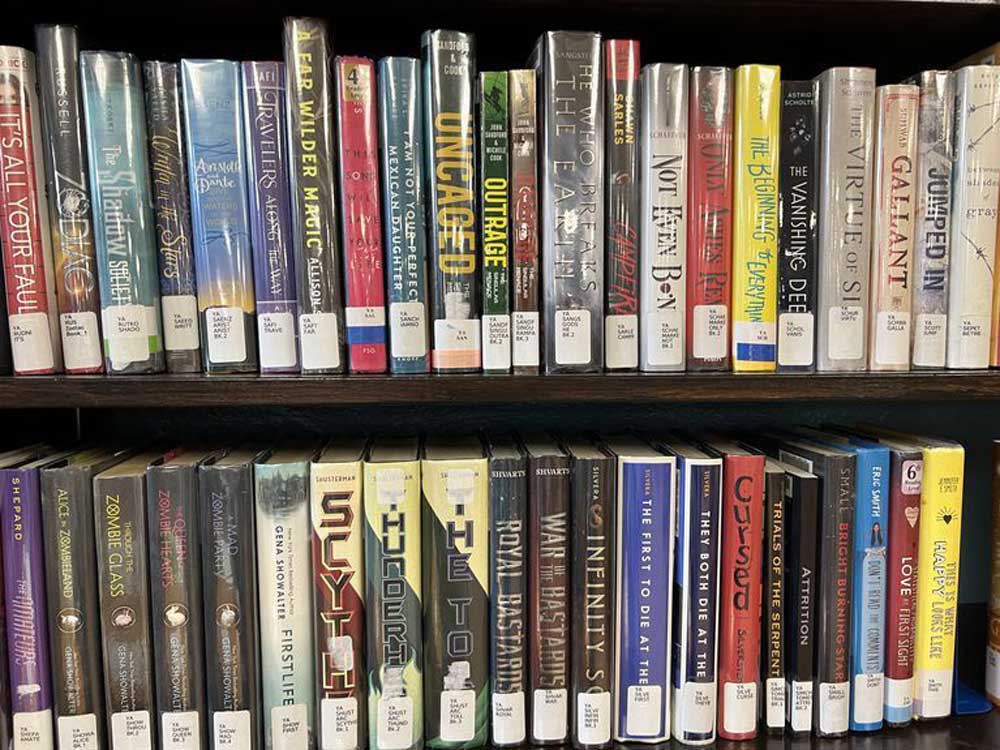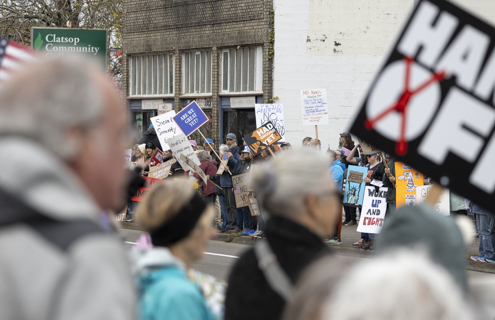Rural Washington library could be nation’s first to dissolve after book challenges
Published 6:57 pm Sunday, August 27, 2023

- Young adult books at the Columbia County Library. Some people have requested to move the young adult section into the adult section because of what they call “obscene” material in 100 of the around 800 books.
The Columbia County Library in southeastern Washington state stands less than a block off Dayton’s Main Street, in a historic red-brick building that now houses more than 30,000 books.
The fate of this building, the contents inside and the community it fosters will be in the hands of 1,076 county voters this November.
Some residents connect the vitriol over the public library to larger culture wars widening divides across the country. Others say it’s a local issue, only affecting the county and its seat, Dayton, home to just one traffic light and the one library.
What started out as a request to remove or reshelve 11 books for children and young adults, which some residents deem pornographic and obscene, has now morphed into the potential dissolution of the county’s only library. If this happens, librarians said everything that’s not nailed down goes to the State Library, from books to computers to furniture. The building would return to the city.
Librarians say this would be the first library in the country to dissolve following a book challenge, although many other libraries and school districts have faced similar challenges.
“I just believe with all my heart that a library is essential to any vibrant community and to our democracy,” said Tanya Patton, who some people refer to as the library’s “godmother.”
Seth Murdock moved to Dayton in 2013. He said he remembers hanging out in libraries as a kid in Alaska, but, he said, things have drastically changed in the last few years.
About a year ago, Murdock said his wife checked out about 15 books that he said were inundated with sexual content and marketed to children. Murdock said he had to do something.
He stood in front of the library Board of Trustees, holding the books, and read excerpts to the audience. He asked the board to use “discretion in their purchase and shelving of books.”
“Libraries have become almost sacred institutions, which allows somebody to get things into them and use them as a vehicle for displaying this kind of stuff and remaining beyond reproach in the minds of a lot of people,” Murdock said in an interview. “It would take a lot for most people to criticize a library. But they’ve reached that point for me.”
Formal process
At the library, any requests to remove books have to go through a formal process. People must submit a request for reconsideration of materials. Then, the library director makes a decision. If someone disagrees with that decision, they can appeal to the library board.
A year ago, people requested 11 books be removed or reshelved from the library. The books featured themes of gender, sexuality, consent and race, said Todd Vandenbark, the former library director.
At the time, Vandenbark said he turned down most of the requests.
“The simple reason that they were not, is that that would be a violation of the First Amendment rights of patrons who would want to see those titles and read those titles,” he said.
Last month, Vandenbark quit his position at the library, after what he called a difficult year.
“After six or so months it was tiring and draining. I knew that somebody else needed to take a turn to step up. When you’re battling fear you have to take turns,” he said. “Being a librarian shouldn’t be controversial. Books shouldn’t be controversial.”
However, Murdock said he felt like he wasn’t listened to. By refusing to remove the books, Murdock said the discussion felt like part of a “broader assault on society that’s infiltrating children with that type of material.”
“It felt like I was paying for something that I found completely wrong,” he said.
A library, he said, should just be books — and it should reflect the community’s values, especially if it is taxpayer-funded.
That’s a fundamental disagreement in the community. Patton said she also doesn’t agree politically with every book on the library’s shelves but said that is the difference between a personal and public library.
“My library at home reflects my values,” she said. “All the books that I have on my bookshelf, reflect my values and my ideals: what works for my family and my faith, but a public library, it’s so important that the collection represents the community.”
Patton teaches at the local high school and said she knows kids need books that reflect their lives and deal with their anxieties and concerns.
Not all agreed. After the book ban failed, people took an even closer look at books on the library’s shelves. On them, they said they noted more than 100 books in the young adult section featuring sexual content. They requested to move the entire young adult section upstairs, merging it with the adult section.
Ellen Brigham, the interim library director, called these concerns a “huge misunderstanding” and a “misuse of the terms grooming and pornography.”
“It is illegal for us to buy obscene materials,” she said. “If we were buying obscene materials, the FBI would want to talk with us; they would want to talk with our distributor. It would be a big deal.”
In an attempt to appease people, Brigham recently incorporated the young adult nonfiction section into the adult nonfiction section. She also announced parents can put restrictions on their minor children’s library accounts.
New type of library
But, those upset with the library have other ideas. Murdock said he’s not sure moving books is the answer. Instead, he proposed a new type of library that would rise from the ashes of the old one.
It would be donor-funded. People could vote with their wallets — don’t like books there? Don’t donate, he said.
“You can approach them and say, ‘Look, we don’t like the direction you’re going. And if you continue, then count us out of it.’ You wouldn’t have any full time employees, just volunteer-grown with a much more modest selection of books,” he said.
Former librarian and Dayton resident Amy Rosenberg said that just won’t work. If the vote goes through, all of the library’s materials, “millions of dollars’ worth of stuff,” would be lost.
“That’s just magical thinking,” she said, referring to building a new library. “We’re going to lose everything, and there’s just no way to get it all back.”





